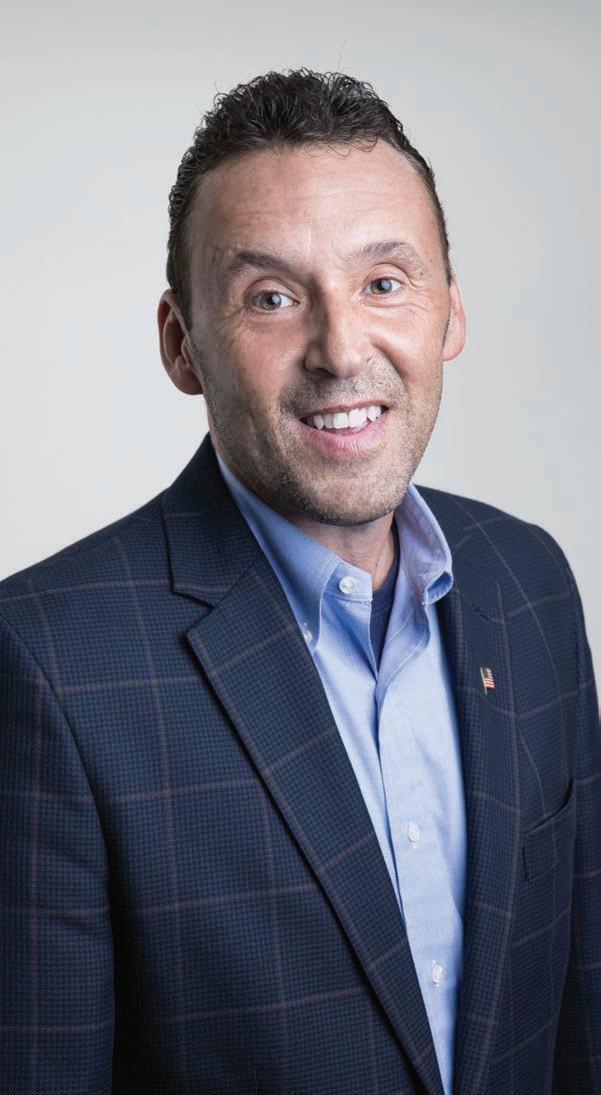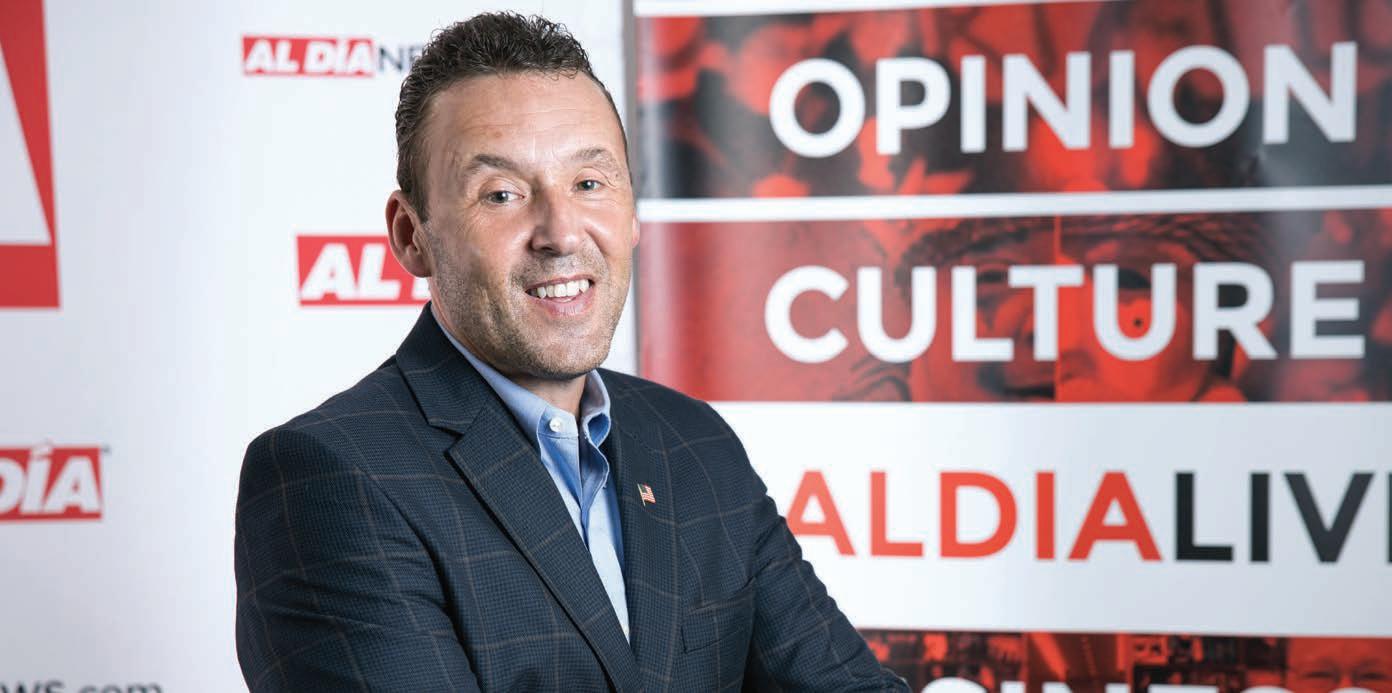
22 minute read
LEADERS LÍDERES
“She Se Puede” was formed for Latinas to recognize and practice the power they possess. Photo by Getty Images
“She Se Puede” fue creado para que las latinas reconozcan y practiquen el poder que poseen. Foto de Getty Images
Advertisement
America Ferrera and Eva Longoria Bastón teamed-up on Aug. 31 to launch “She Se Puede,” a digital lifestyle community geared towards empowering Latinas for transformative action.
It’s a nonprofit initiative said to “inspire, affirm, and inform Latinas so they can leverage their power to transform their lives, their families, their community, and their nation.”
The Latino demographic is projected to be the largest non-white voting demographic eligible to vote in the 2020 presidential election. Latinos slowly realize their own power and the tremendous impact their voices can bring to the election, especially on pivotal down-ballot races.
“This election year, everyone is reminded of the Latino population numbers and how fast we are growing as a community. But let’s be clear: demography is not destiny.” said activist and TV star America Ferrera. “Unless and until we believe in our own potential and realize our own power, we will remain underrepresented as a political and cultural force.”
A force indeed.
She Se Puede’s Latina founders range from activists and CEOs to
ENGLISH
campaign strategists and researchers, paving the way specifically for the Latinx community and Latina advocacy. 2020 is expected to be the year Latinx voters make a decisive mark on national elections, and Latinas play an extensive role.
“The role that Latinas play in our communities and our families, they’re our matriarchs, they’re the glue that holds our families and our communities together,” wrote Stephnie Valencia, co-founder and president of Equis Labs — and now also co-founder of "She Se Puede.”
A 2018 Pew Research study found Latina women are more dissatisfied with the way things are going in the country than men, with 73% of Latinas backing Democratic candidates.
“Welcome to @She_SePuede,” announced Eva Longoria Bastón on Twitter. “A new destination for the modern Latina.”
“She Se Puede! Together with mis hermanas, we’ve created [She Se Puede], a new digital lifestyle community that inspires affairs and informs Latinas to leverage our power in a way that transforms our lives, families, and community. Mujeres, this is for you.” Longoria-Bastón wrote.
‘SHE SE PUEDE’ EMPOWERING LATINAS TO VOTE AMERICA FERRERA AND EVA LONGORIA LAUNCH A DIGITAL PLATFORM FOR LATINAS, BY LATINAS.
AMÉRICA FERRERA Y EVA LONGORIA LANZAN UNA PLATAFORMA DIGITAL PARA LAS LATINAS, POR LAS LATINAS.
By | Por: ERICKA CONANT AL DÍA News staff writer
ESPAÑOL
America Ferrera y Eva Longoria Bastón se unieron el 31 de agosto para lanzar “She Se Puede”, una comunidad de estilo de vida digital orientada a empoderar a las latinas para una acción transformadora.
Es una iniciativa sin fines de lucro que se dice "inspira, afirma e informa a las latinas para que puedan aprovechar su poder para transformar sus vidas, sus familias, su comunidad y su nación".
Se proyecta que los latinos serán el mayor grupo demográfico no blanco con derecho a voto en las elecciones presidenciales de 2020. Los latinos se dan cuenta lentamente de su propio poder y del tremendo impacto que sus voces pueden tener en las elecciones, especialmente en las elecciones decisivas.
“Este año electoral, se le recuerda a todo el mundo las cifras de la población latina y lo rápido que estamos creciendo como comunidad. Pero seamos claros: la demografía no es el destino”, dijo la activista y estrella de televisión America Ferrera. “A menos que y hasta que creamos en nuestro propio potencial y nos demos cuenta de nuestro propio poder, seguiremos estando subrepresentados como fuerza política y cultural”.
Las fundadoras latinas de “She Se Puede” van desde activistas y directoras ejecutivas hasta estrategas de campaña e investigadoras, preparando el camino específicamente para la comunidad Latinx y la defensa de las latinas.
Se espera que el 2020 sea el año en que los votantes de Latinx dejen una marca decisiva en las elecciones nacionales, y las latinas juegan un papel importante. "El papel que las latinas desempeñan en nuestras comunidades y nuestras familias, son nuestras matriarcas, son el pegamento que mantiene unidas a nuestras familias y nuestras comunidades", escribió Stephnie Valencia, cofundadora y presidenta de Equis Labs - y ahora también cofundadora de “She Se Puede”.
Un estudio de Pew Research del 2018 encontró que las mujeres latinas están más insatisfechas con la forma en que van las cosas en el país que los hombres, con el 73% de las latinas apoyando a los candidatos demócratas.
“Bienvenidos a @She_SePuede", anunció Eva Longoria Bastón en Twitter. "Un nuevo destino para la latina moderna”.
“She Se Puede! Junto con mis hermanas, hemos creado [She Se Puede], una nueva comunidad de estilo de vida digital que inspira los asuntos e informa a las latinas para aprovechar nuestro poder de una manera que transforma nuestras vidas, familias y comunidad. Mujeres, esto es para ustedes”. Longoria-Bastón escribió.
HISPANIC AWARDEE
AN ARCHETYPE OF OUR HISTORY
MONTH 2020 BUSINESS CATEGORY
RECONCILING “RODRIGUEZ”






LOU RODRIGUEZ’S JOURNEY TO FOUNDING HIS OWN ENGINEERING FIRM IS A STORY OF HARD WORK, A LITTLE LUCK, AND A WHOLE LOT OF EMPOWERMENT.
EL VIAJE DE LOU RODRÍGUEZ PARA FUNDAR SU PROPIA EMPRESA DE INGENIERÍA ES UNA HISTORIA DE TRABAJO DURO, UN POCO DE SUERTE, Y GRAN EMPODERAMIENTO.
By | Por: NIGEL THOMPSON AL DÍA News Content Producer
Growing up, Lou Rodriguez admits he tried to stay away from the subject of his last name as much as he could.
Born to a Puerto Rican father and Polish mother in Chester, Pennsylvania, Rodriguez’s family had both deep and new roots in the area. His mother Christine’s family had been there for decades, while his father Luis’ came from Utuado, Puerto Rico in 1953.
As industry left and the jobs dried up in Chester, the family moved and settled close by in Ridley Park, where Rodriguez spent the majority of his childhood.
AVOIDING WHITE SUBURBIA’S GLARE
Back then, in the 1970s and 80s, the Delaware County suburb that sits in the shadow of Philadelphia was much as it is today: a predominantly white, middle-class town.
“If you said ‘Hispanic’ or ‘Latino,’ nobody even knew what that meant,” said Rodriguez.
If it was said, the only subgroup recognized were Puerto Ricans, who were the
ENGLISH
predominant group of Latinos that had established enclaves in parts of nearby Philadelphia.
Popular culture of the time was also not kind to them.
Rodriguez remembers the character Julio from Sanford and Son and Freddie Prinze’s Chico in Chico and the Man as some of the early negative media portrayals of Puerto Ricans and the wider Latino population of the U.S.
The result was avoidance of discussing his Latino roots whenever they were questioned to limit ridicule.
“If there’s something different, someone’s going to pick it out,” said Rodriguez. “As a child, you’re just like: ‘God forbid’ you get teased or bullied, so you do everything you can to avoid it.”
In addition to being Puerto Rican, his Polish roots also put a target on his back in the neighborhood.
“Which one do you want to choose?” is how he described the dynamic.
Whenever Rodriguez was questioned about his last name, he would say he was “Spanish.”
“Leave it at that,” he said.
The dynamic was later explored by
ESPAÑOL
Al crecer, Lou Rodríguez admite que trató de mantenerse alejado del tema de su apellido tanto como pudo.
Nacido de padre puertorriqueño y madre polaca en Chester, Pennsylvania, la familia de Rodríguez tenía raíces profundas y nuevas en la zona. La familia de su madre Christine había estado allí durante décadas, mientras que la de su padre Luis vino de Utuado, Puerto Rico en 1953.
Cuando la industria se fue y los trabajos se secaron en Chester, la familia se mudó y se estableció cerca de Ridley Park, donde Rodríguez pasó la mayor parte de su infancia.

EVITANDO EL RESPLANDOR DE LOS SUBURBIOS BLANCOS
En aquel entonces, en los años 70 y 80, el suburbio del condado de Delaware que se encuentra a la sombra de Filadelfi a era mucho más parecido a lo que es hoy: una ciudad predominantemente blanca y de clase media.
“Si decías 'hispano' o 'latino', nadie sabía siquiera lo que eso signifi caba”, dijo Rodríguez.
Si se decía, el único subgrupo reconocido eran los puertorriqueños, que eran el grupo predominante de latinos que habían establecido enclaves en partes de la cercana Filadelfi a.
La cultura popular de la época tampoco era amable con ellos.
Rodríguez recuerda el personaje Julio de Sanford and Son y el Chico de Freddie Prinze en Chico and the Man como algunas de las primeras representaciones negativas de los puertorriqueños y de la población latina en general de los EE.UU. en los medios de comunicación.
El resultado fue evitar discutir sus raíces latinas cuando se las cuestionaba para limitar el ridículo.
“Si hay algo diferente, alguien lo va a subrayar”, dijo Rodríguez. “Cuando eres niño, eres como: 'Dios no permita' que se burlen de ti o te intimiden, así que haces todo lo posible para evitarlo”.
Además de ser puertorriqueño, sus raíces polacas también le pusieron una diana en la espalda en el vecindario.
“¿Cuál quieres elegir?” es como describió la dinámica.
Cada vez que se le preguntaba a Rodríguez por su apellido, decía que era “español”.


MONTH 2020
Rodriguez is the son of a Puerto Rican father and a Polish mother. Photo by Harrison Brink
ENGLISH

From pag. 12 | Rodriguez’s sister, Diana, who is now a published author.
One of the book series she’s written very much follows her own struggle growing up with a Latina identity surrounded by white and European on all sides.
The series follows a 15-year-old Puerto Rican protagonist, Mariana Ruiz, who is sent on a journey back to Puerto Rico to discover the roots she had ignored her whole life up to that point.
“My story was kind of similar,” said Rodriguez. “I wasn’t necessarily running around and advertising it even into my professional life.”
SCHOOL BLUES
As for school, Rodriguez admitted he didn’t like it growing up, being initially much more drawn to its social aspects like parties and sports.
But he did also like computers and had a natural talent for math.
When applying for college, the combination of the two led him to fi rst study computers at Millersville University in Lancaster, PA.
Unfortunately, Rodriguez’s party life hadn’t left him yet, and his fi rst year at college was an academically tumultuous one.
“I fall fl at on my face,” said Rodriguez.
A SUMMER OF GROWTH
He returned home for the summer after his freshman year and took a construction job that would prove to be life-changing.
One day while on a job site digging a hole for a new septic system, Rodriguez spotted a crew of peculiar-looking men chopping their way through the nearby woods with a machete and tying ribbons to trees.
Their ritual was foreign but seemed to impact the work he was doing as a laborer.
“I just knew everywhere they put a ribbon, we knocked that tree down,” said Rodriguez.
He asked who the machete-wielding men were.
“Those are the engineers,” was the reply.
In that moment, Rodriguez knew he wanted to be one of them someday.
With a renewed motivation, he went home and told his parents about his change of life plans. Rather than return to Millersville and continue with computers, Rodriguez would transfer to his dad’s alma mater of Widener University and switch majors to engineering.
He initially confi ded in his mother, whom he called a “saint” and was typically also his toughest critic and greatest adviser growing up.
“It’s going to be hard, and you’re probably going to struggle,” was her response, but she supported the notion of seeing her son’s newfound confi dence.
In going to Widener, his father only had one request: “don’t be an accountant.”
As the main breadwinner in the family, Luis Rodriguez was the fi rst in his family to ever get a college education.
When he came from Utuado, he initially worked with his father in Chester and at fi rst followed in his footsteps of holding multiple jobs to support his own young family.
“My dad looked around and said: ‘This isn’t the life,’” said Rodriguez.
So, while working as a stock boy at General Electric and raising a young family, Luis, went to night school at Widener and got his accounting degree after eight years.
Rodriguez was young when Luis got his degree, but the memory of going to his dad’s graduation ceremony stuck in his mind as he made the decision to go to Widener, where he would graduate with a civil engineering degree in 1991.
A KNACK FOR NETWORKING
As he entered the workforce, Rodriguez started with the Philadelphia Water Department.
There, beyond fi nding fascination with the city’s grand, artistic blueprints for its 150-year-old water infrastructure, Rodriguez was also in the business of interacting with the public affected by the department’s projects.
“The Water Department, anytime they decide to dig a lot of people get impacted,” he said. “So the engineer’s role in a lot of cases was coordinate, and resolve issues.”
In the process, Rodriguez found he had a knack for talking to people and negotiating.
“I just want to be outside, I want to talk to people, I want to get in rooms and make deals,” he said of his early realization.
Before he would leave the city in 1999, Rodriguez would further refi ne his ability to connect with people as the city’s fi rst Geospatial Information System (GIS) Program Manager, which involved him fl ying around the country to meet with other experts in the cutting-edge mapping technology.
REALIZING RODRIGUEZ CONSULTING
When he left, Rodriguez entered the private sector for a number of years before starting his own engineering consulting fi rm, Rodriguez, in 2007.
The company was a refurbishing of the last engineering fi rm he worked for before realizing his own business aspirations.
“I was diving into the deep end without really knowing how to swim,” said Rodriguez.
In the early days, he said his wife, Nicole, was the main support beam for his business and family and has been ever since he started the company.
“There would be no fi rm without her,” he said.
MONTH 2020
Having grown up in Delaware County during the 1970s and 1980s, Rodriguez had to make peace with his immigrant background. Photo by Harrison Brink

Tras haber crecido en el condado de Delaware durante los años 70 y 80, Rodríguez debió hacer las paces con su trasfondo inmigrante. Foto de Harrison Brink
RECONCILING “RODRIGUEZ”
Early on, he was also approached by people in the city about identifying Rodriguez as a minority-owned business.
“That was the fi rst time really anyone had said: ‘Hey, we know you’re this. Why aren’t you identifying with it?” said Rodriguez.
He also had concerns about being undeserving of the label because of his inability to speak Spanish and little interaction with the Latino community outside of those in his family.
To help ease some of his insecurities, Rodriguez was pointed to the Greater Philadelphia Hispanic Chamber of Commerce.
In his fi rst meeting with the chamber, Rodriguez was honest about them and realized the world was way different from the 70s and 80s of his childhood.
“Things have changed,” was the message he got.
In a meeting with GPHCC’s then-president Varsovia Fernandez, Rodriguez also found out he was a rare fi nd in his fi eld.
“There are lots of faces that are successful, there are none that are an engineer,” Fernandez told him.
To further cement the perfect match, the chamber also needed access to the Philadelphia Water Department, which doles out some of the most money for contracts of any city department.
SUSTAINED SUCCESS AND THE FUTURE
For the next 13 years, both Rodriguez’s business and involvement with GPHCC have fl ourished.
On the business side, Rodriguez said his keys to staying successful are two things: money and people — with a heavy emphasis on the latter.
“I don’t do the work in Rodriguez Consulting. My strength was being able to assemble people — a team — that was able to play this game,” he said.
Rodriguez said it’s taken all of 13 years to build that “team” to win the “Super Bowl” or “World Series” as he calls it, but it’s created a family in the process.
He spoke with joy of being able to see younger employees not only grow as professionals but also grow personally within the business.
“To me, that’s the biggest joy I get out of it. The freedom that business offers, but also the ability to affect lives,” said Rodriguez.
In the chamber, he’s risen to the position of Chairman of its Board of Directors.
Rodriguez’s goal there is to remove the “minority” label he came there with for all who associate with the chamber.
“I don’t want you hiring me because I have an ‘M’ in front of the business name. I don’t want that to be the reason,” he said. “I want to be seen as just: we’re good.”
It transforms into a question of how to evolve for not just the Latino business community of Philadelphia, but the Latino community as a whole in the U.S.
With leaders like Rodriguez, we might just get there someday.
MONTH 2020





Rodriguez trained as an engineer at Widener University. Photo by Harrison Brink
Rodríguez se formó como ingeniero en la Universidad de Widener. Foto de Harrison Brink
ESPAÑOL
Viene pag. 12|
“Déjalo así”, dijo.
La dinámica fue explorada más tarde por la hermana de Rodríguez, Diana, ahora autora publicada.
Una de las series de libros que ella ha escrito sigue mucho su propia lucha creciendo con una identidad latina rodeada de blancos y europeos por todos lados.
La serie sigue a una protagonista puertorriqueña de 15 años, Mariana Ruiz, que es enviada en un viaje de regreso a Puerto Rico para descubrir las raíces que había ignorado toda su vida hasta ese momento.
“Mi historia era algo similar", dijo Rodríguez. "No estaba necesariamente corriendo por ahí y anunciándola incluso en mi vida profesional”.
LA MELANCOLÍA ESCOLAR
En cuanto a la escuela, Rodríguez admitió que no le gustaba, siendo inicialmente mucho más atraído por sus aspectos sociales como las fi estas y los deportes.
Pero también le gustaban las computadoras y tenía un talento natural para las matemáticas.
Cuando aplicó a la universidad, la combinación de ambos lo llevó a estudiar primero computación en la Universidad de Millersville en Lancaster, PA.
Desafortunadamente, la vida fi estera de Rodríguez no lo había dejado todavía, y su primer año en la universidad fue académicamente tumultuoso.
“Me caí de bruces”, dijo Rodríguez.
UN VERANO DE CRECIMIENTO
Regresó a casa por el verano después de su primer año y tomó un trabajo de construcción que le cambiaría la vida.
MONTH 2020
Un día, mientras estaba en un sitio de trabajo cavando un agujero para un nuevo sistema séptico, Rodríguez vio a un grupo de hombres de aspecto peculiar abriéndose camino a través de los bosques cercanos con un machete y atando cintas a los árboles.
Su ritual era extraño pero parecía impactar en el trabajo que estaba haciendo como obrero.
“Sabía que en cualquier lugar donde pusieran una cinta, derribaríamos ese árbol”, dijo Rodríguez.
Preguntó quiénes eran los hombres con machetes.
“Esos son los ingenieros”, fue la respuesta.
En ese momento, Rodríguez supo que quería ser uno de ellos algún día.
Con una motivación renovada, volvió a casa y le contó a sus padres sobre su cambio de planes de vida. En lugar de regresar a Millersville y continuar con las computadoras, Rodríguez se trasladaría al alma mater de su padre, la Universidad de Widener, y cambiaría las especialidades a ingeniería.
Inicialmente se confi ó en su madre, a la que llamó "santa" y fue también su crítica más dura y su mejor consejera durante su infancia.
“Va a ser difícil, y probablemente vas a tener que luchar”, fue su respuesta, pero apoyó la idea al ver la nueva confi anza de su hijo.
Al ir a Widener, su padre sólo tenía una petición: “no seas un contable”.
Como el principal sostén de la familia, Luis Rodríguez fue el primero en recibir una educación universitaria.
Cuando vino de Utuado, inicialmente trabajó con su padre en Chester y al principio siguió sus pasos de tener múltiples trabajos para mantener a su joven familia.
“Mi padre miró a su alrededor y dijo: 'Esta no es la vida'”, dijo Rodríguez.
Así que, mientras trabajaba como mozo de almacén en General Electric y criaba una joven familia, Luis, fue a la escuela nocturna en Widener y obtuvo su título de contable después de ocho años.
Rodríguez era joven cuando Luis obtuvo su título, pero el recuerdo de ir a la ceremonia de graduación de su padre se le quedó grabado en la mente cuando tomó la decisión de ir a Widener, donde se graduaría de ingeniero civil en 1991.
UNA HABILIDAD PARA LA CREACIÓN DE REDES
Al entrar en la fuerza de trabajo, Rodríguez comenzó con el Departamento de Agua de Filadelfi a.
Allí, más allá de encontrar fascinación con los grandes y artísticos planos de la ciudad para su infraestructura de agua de 150 años de antigüedad, Rodríguez también estaba en el negocio de interactuar con el público afectado por los proyectos del departamento.
“El Departamento de Agua, cada vez que deciden excavar, mucha gente se ve afectada”, dijo. “Así que el papel del ingeniero en muchos casos era coordinar y resolver problemas”.
En el proceso, Rodríguez descubrió que tenía un don para hablar con la gente y negociar.
“Sólo quiero estar afuera, quiero hablar con la gente, quiero entrar en las habitaciones y hacer tratos”, dijo de su temprana realización.
Antes de dejar la ciudad en 1999, Rodríguez perfeccionaría aún más su capacidad para conectarse con la gente como el primer Gerente de Programa del Sistema de Información Geoespacial (GIS) de la ciudad, lo que lo llevó a volar por todo el país para reunirse con otros expertos en la tecnología cartográfi ca de vanguardia.
CREANDO RODRÍGUEZ CONSULTING
Cuando se fue, Rodríguez entró en el sector privado durante varios años antes de iniciar su propia empresa de consultoría de ingeniería, Rodríguez, en 2007.
La empresa era una remodelación de la última empresa de ingeniería para la que trabajó antes de realizar sus propias aspiraciones empresariales.
“Me estaba sumergiendo en las profundidades sin saber realmente cómo nadar”, dijo Rodríguez.
En los primeros días, dijo que su esposa, Nicole, era la principal viga de apoyo para su negocio y su familia, y lo ha sido desde que comenzó la compañía.
“No habría ninguna empresa sin ella”, dijo.
RECONCILIAR EL “RODRÍGUEZ”
Desde el principio, la gente de la ciudad también se acercó a él para identifi car a Rodríguez como una empresa propiedad de una minoría.
“Esa fue la primera vez que alguien dijo: 'Oye, sabemos que eres esto. ¿Por qué no te identifi cas con eso?” dijo Rodríguez.
También le preocupaba no merecer la etiqueta por su incapacidad para hablar español y la poca interacción con la comunidad latina fuera de los miembros de su familia.
Para ayudar a aliviar algunas de sus inseguridades, Rodriguez fue señalado a la Cámara de Comercio Hispana de Filadelfi a.
En su primera reunión con la cámara, Rodríguez fue honesto con ellos y se dio cuenta de que el mundo era muy diferente de los años 70 y 80 de su infancia.
“Las cosas han cambiado”, fue el mensaje que recibió.
En una reunión con la entonces presidenta de la GPHCC, Varsovia Fernández, Rodríguez también descubrió que era un hallazgo poco común en su campo.
“Hay muchas caras que tienen éxito, no hay ninguna que sea ingeniero”, le dijo Fernández.
Para consolidar aún más la coincidencia perfecta, la cámara también necesitaba acceso al Departamento de Agua de Filadelfi a, que reparte la mayor cantidad de dinero para contratos de cualquier departamento de la ciudad.
EL ÉXITO SOSTENIDO Y EL FUTURO
Durante los siguientes 13 años, tanto el negocio de Rodríguez como su participación en la GPHCC han fl orecido.
En cuanto a los negocios, Rodríguez dijo que sus claves para seguir siendo exitoso son dos cosas: el dinero y la gente, con un fuerte énfasis en esta última. "Yo no hago el trabajo en Rodríguez Consulting. Mi fortaleza fue ser capaz de reunir a la gente –un equipo– que fue capaz de jugar este juego", dijo.
Rodriguez dijo que le ha llevado 13 años construir ese "equipo" para ganar el "Super Bowl" o la "Serie Mundial", como él lo llama, pero que ha creado una familia en el proceso.
Habló con alegría de poder ver a los empleados más jóvenes no sólo crecer como profesionales sino también crecer personalmente dentro del negocio. "Para mí, esa es la mayor alegría que obtengo de esto. La libertad que ofrecen los negocios, pero también la capacidad de afectar las vidas", dijo Rodríguez.
En la cámara, ha ascendido al puesto de Presidente de su Consejo de Administración.
El objetivo de Rodríguez es eliminar la etiqueta de "minoría" con la que llegó allí para todos los que se asocian con la cámara. "No quiero que me contraten porque tengo una 'M' delante del nombre de la empresa. No quiero que esa sea la razón", dijo. "Quiero que me vean como lo que somos: buenos".
Se transforma en una cuestión de cómo evolucionar no sólo para la comunidad empresarial latina de Filadelfi a, sino para la comunidad latina en su conjunto en los EE.UU.
Con líderes como Rodríguez, podríamos llegar allí algún día.








